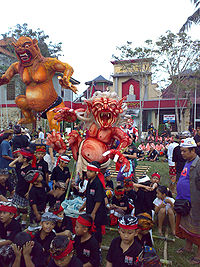- Nyepi
-
 Ogoh-ogoh being paraded in Ngrupuk or The Bhuta Yajna Ritual.
Ogoh-ogoh being paraded in Ngrupuk or The Bhuta Yajna Ritual.
Nyepi is a Balinese "Day of Silence" that is commemorated every Isakawarsa (Saka new year) according to Bali's calendar (in 2012, it will be on March 23rd). It is a day of silence, fasting, and meditation. The day following Nyepi is also celebrated as New year.[1][2]
Observed from 6 a.m. until 6 a.m. the next morning, Nyepi is a day reserved for self-reflection and as such, anything that might interfere with that purpose is restricted. The main restrictions are: no lighting fires (and lights must be kept low); no working; no entertainment or pleasure; no traveling; and for some, no talking or eating at all. The effect of these prohibitions is that Bali’s usually bustling streets and roads are empty, there is little or no noise from TVs and radios, and few signs of activity are seen even inside homes. The only people to be seen outdoors are the Pecalang, traditional security men who patrol the streets to ensure the prohibitions are being followed.
Although Nyepi is primarily a Hindu holiday, non-Hindu residents of Bali observe the day of silence as well, out of respect for their fellow citizens. Even tourists are not exempt; although free to do as they wish inside their hotels, no one is allowed onto the beaches or streets, and the only airport in Bali remains closed for the entire day. The only exceptions granted are for emergency vehicles carrying those with life-threatening conditions and women about to give birth.
On the day after Nyepi, known as Ngembak Geni, social activity picks up again quickly, as families and friends gather to ask forgiveness from one another, and to perform certain religious rituals together.
Rituals
- First, The Melasti Ritual is performed at the 3-4 previous day. It is dedicated to Sanghyang Widhi Wasa and is performed at the beach to respect them as the owner of The Land and Sea. The ritual performed in Pura (Balinese temple) near the sea (Pura Segara) and meant to purify Arca, Pratima, and Pralingga (sacred objects) belongs to several temples, also to acquire sacred water from the sea.
- Second, The Bhuta Yajna Ritual is performed in order to vanquish the negative elements and create balance with God, Mankind, and Nature. The ritual also meant to appease Batara Kala by Pecaruan offering. Devout Hindu Balinese villages usually make ogoh-ogoh, demonic statues made of bamboo and paper symbolizing negative elements or malevolent spirits. After the ogoh-ogoh have been paraded around the village, the Ngrupuk ritual takes place, which involves burning the ogoh-ogoh.
- Third, The Nyepi Rituals is performed with the following conditions:
- Amati Geni: No fire/light, including no electricity
- Amati Karya: No working
- Amati Lelunganan: No travelling
- Amati Lelanguan: Fasting and no revelry/self-entertainment
- Fourth, The Yoga/Brata Ritual starts at 6:00 AM (e.g. March 26, 2009) and continues to 6:00 AM the next day.
- Fifth, The Ngembak Agni/Labuh Brata Ritual is performed for all Hindus to forgive each other and to welcome the new days to come.
- Sixth and finally, The Dharma Shanti Rituals is performed as the Nyepi Day or "Day of Silence."
References
- ^ Hogue, Thomas (2006-03-24). "In Bali, a holiday for the ears". The New York Times (New York: NYTC). ISSN 0362-4331. http://www.nytimes.com/2006/03/24/opinion/24iht-edhogue.html. Retrieved 2011-03-07.
- ^ Onishi, Norimitsu (2011-03-06). "Silence Befalls Bali, but Only for a Day". The New York Times (New York: NYTC). ISSN 0362-4331. http://www.nytimes.com/2011/03/07/world/asia/07indonesia.html. Retrieved 2011-03-07.
External links
- Juniartha, I Wayan (2008-03-06). "Nyepi, in search of the silence within". The Jakarta Post. http://www.thejakartapost.com/news/2008/03/05/nyepi-search-silence-within.html. Retrieved 2009-01-13.
- "Nyepi: Bali's day of silence". indo.com. http://www.indo.com/culture/nyepi.html. Retrieved 2009-01-13.
- "Nyepi Day, a silence day to mark Balinese New Year". balifriend.net. http://www.balifriend.net/nyepi_day.html. Retrieved 2009-01-13.
- Dhadhiati, Anna. "Nyepi: the balinese silence". essortment.com. http://www.essortment.com/all/nyepibalinese_rnqr.htm. Retrieved 2009-01-13.
- "Nyepi: New Year in Bali". villajegeg.com. 2011-01-30. http://www.villajegeg.com/what-to-see-in-bali/nyepi-balinese-new-year/. Retrieved 2011-01-30.
Categories:- March observances
- New Year celebrations
- Public holidays in Indonesia
- Balinese calendar
- Festivals in Indonesia
Wikimedia Foundation. 2010.
